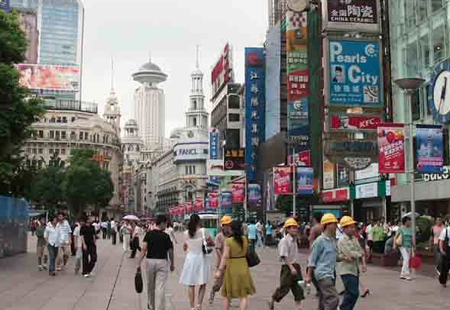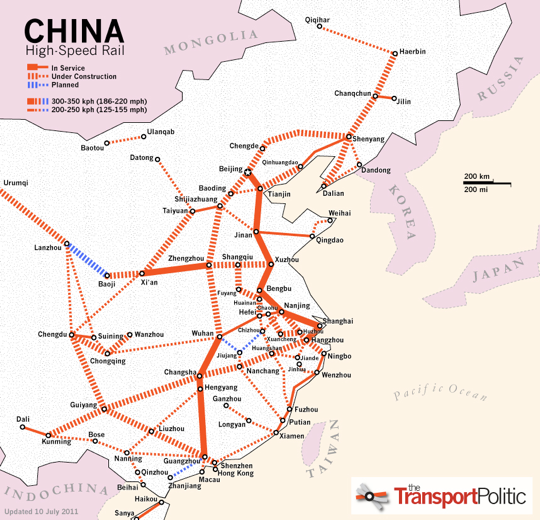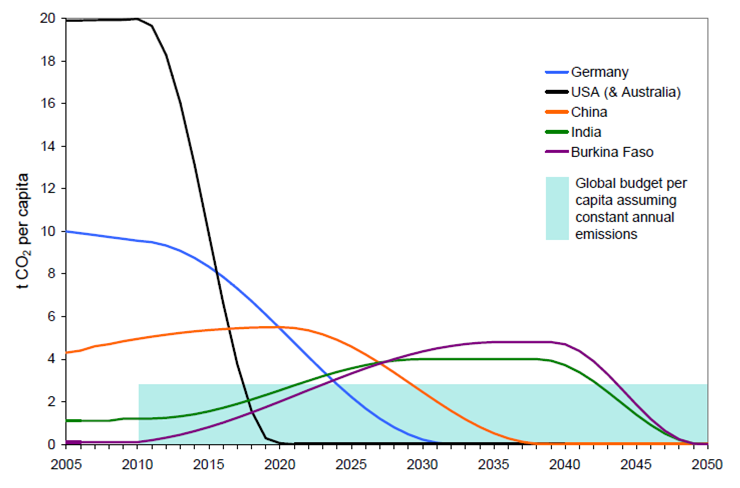China, From the Inside Out
Posted on 19 July 2011 by Rob Honeycutt
I have been traveling to China for nearly 15 years now for both business and pleasure. Ten years ago I married a wonderful woman in China and now have the unique perspective of being an adopted member of a normal middle-class Chinese family. My wife and I travel back to China annually for her to see her family and to get our two kids fully immersed in speaking Chinese. This year I thought I would take the opportunity to take a look at climate issues related to China, from an inside perspective.

The year we were married when I first traveled to Chongqing (CQ), my wife's home town, I was stunned by the level of air pollution. I mean, this had to be what London looked like in the late-1800s. Every day, even on the best days, visibility was no more than 1-2 miles. I have a pilot's license and I would always comment that every day is IFR (instrument flight rules) in CQ (VFR, or visual flight rules, in most air space requires a minimum 3 statute miles visibility). The air there has consistently been like this every year I've visited.
This year I noted a marked difference. I fully admit this is anecdotal, so there could be influence from the weather pattern on this trip, but the air was significantly cleaner. The entire week I was in CQ we had 10+ SM visibility. Don't get me wrong. It was still hazy and polluted. There was, though, a noticeable improvement.
I pointed this out to my wife's family and they agreed saying that the central government has been aggressively closing down older, dirtier generating plants in favor of newer ones. They say the older plants are given notice to clean up and if they don't the government just goes in and shuts it down.
This article popped up on Grist last August regarding a Chinese government policy to clean up air pollution (the Chinese government doc can be read here). They state that the government has shut down over 50 gigawatts of older coal plants, meaning they literally blow up the smoke stack with a government official present.
A walk in an average Chinese carbon footprint
To travel to China on holiday or for business is one thing, and something I highly recommend to anyone who has the opportunity, but living with a Chinese family is a wholly different experience altogether. This year I made a number of notes related to the carbon footprint of a middle class Chinese.
Transportation: While we all know that auto sales are increasing in China, my wife's extended family, of maybe 20 people, still owns no cars (save one cousin in Shenzhen). This a solidly middle class family. They all get around the city by taxi or bus. CQ is currently building a subway system that should start coming online in about 2 years.
In daily life there's really not much need for a personal vehicle. It's more of a status symbol for those who own cars. Almost all the family shopping can be done within about a mile of their home. There is a full size mall maybe 2 miles away. We went out shopping for groceries, clothing, plane tickets, foot massage one afternoon, dinner at any number of restaurants... all on foot, usually requiring no more than 15-20 mins walking.
Food: If you know anyone who is Chinese you understand that food is central to Chinese culture. About half our meals were eaten at home, and I would have to say that pretty much all the food we ate was locally grown. The person on the street with a cart-load of corn did not push the cart from far away, and most of our food was purchased from street vendors like this. The countryside surrounding CQ is all small independently operated farms supplying the city population of some 20 million. Eating is a social activity that takes place nearly 24 hours a day. It's not unusual for a family member to suggest going out for barbeque at 2am to discover there are several million other people also out for barbeque at 2am.
Heating and cooling: Summers in CQ are hot. It's regularly in the 90s and often up into the 100s Fahrenheit (30-40C). Most CQ apartments are equipped with an upright heating/cooling unit in one corner of the living room. Interestingly though, Chinese won't use the air conditioning throughout the day, not as a matter of cost, but because they like "fresh air" (even if that fresh air is stiflingly hot). They'll run the air conditioning in the afternoon to escape the hottest part of the day. Even at that there were no second thoughts when they wanted to spend the day playing cards on a Sunday at one of the aunts' apartment who does not have air conditioning.
I've been in CQ a few times for Chinese New Year in late January or early February. The flip side there is they really don't like heaters. If you close the windows and turn the heater on it's about 5 minutes before some family member walks into the house saying, "My gosh it's stuffy in here, let's open some windows" even though it's maybe 45F (7C) outside. What I noted is in the winter everyone dresses warm, for both the inside and outside. They are well layered and comfortable without the heat.
Appliances: There is a thriving market for appliances in China and I'm sure those companies are seeing a boom with no end in sight. However, everything is small: little refrigerators, little cooktops. Most people still prefer to wash clothes by hand in a small sink that is off the kitchen in every Chinese apartment, and every Chinese apartment has their laundry drying out on the front balcony. As you stand out on my wife's parents' balcony you can look at the hundreds of other apartments that are exactly the same.
Is this just transitional?
You might think that this is just a snapshot of Chinese culture on their way to bigger and better things, but I'm not so sure of that. Just across the border back in Hong Kong, which has obviously had the opportunities of a first world lifestyle for many more decades than even the most advanced areas of the mainland, what you see there is... little refrigerators, hand washing and drying clothes, travel mostly by taxi and train, and "fresh air" over a toasty room. My own inclination is to believe that Chinese culture is just less carbon intensive, per capita, than western culture.
Transportation infrastructure
While I was there on this trip I needed to do some business in the Shenzhen area. I had an interesting conversation with one associate on the future of transportation in China. We both noted that even though car ownership is clearly up, the government is not building roadways as aggressively as they were even just 5 years ago. This is resulting in lots of traffic jams even on what used to be low-traveled highways. On the other hand, the new high speed rail just opened between Shanghai and Beijing. There is a new extensive subway system that has opened in the region of Shenzhen closest to the Hong Kong border running five different lines. There is also a new rail system under construction linking the entire Pearl River Delta area running from ZhuHai (near Macau) up through Guangzhou and back down to Shenzhen.
And that ain't all!
Here is a map of all the high speed rail that is either built or under construction in China.

The central government's apparent raison d'État is to bring their entire nation of 1.4 billion people up to first world standards. They have succeeded in many respects with about 400 million, though it is likely impossible for an automobile based transportation system to serve the needs of so many people. My associate and I were speculating that, by design, the government may likely be focusing more funding on the rail projects and not letting the road system keep pace with car ownership as a way to ensure a successful social transition to the new rail system.
Conclusions
We all know that China has now surpassed the US in total carbon output. That's obviously not a good thing. The bright side is their carbon output is likely less a function of individual carbon intensity and more about both the pace of growth in China and the fact that they are currently the world's factory.
Climate change is not yet a primary issue from the standpoint of the central government in China. Their first and foremost purpose is bring up the living standards of another billion people and with that comes a great deal more energy consumption. Although, I do need to note that China is planning to set up a carbon trading platform by 2015, so climate change is definitely on their radar.
Behind that is going to be providing China with clean air and other natural resources. Again here, brace yourself, I suspect China is in the same process we went through enacting the Clean Air Act. That is likely to reduce aerosol effects and unmask additional CO2-forced warming [Kaufman 2011].
On the positive side, China is moving forward on a great many clean energy initiatives which for them represent long term energy independence, with 138 GW projected installed wind generation by 2020, and 10 GW from solar by 2015. This on top of the fact that China is clearly investing in an ambitious clean transportation infrastructure.
While I don't believe China's carbon output will be falling any time soon, I also believe they are better positioned than the US is to eventually cut their carbon emissions with little disruption to their economy.
When it finally becomes crucial that humanity addresses global warming we in the west are going to be playing a very ugly game of catch up.































 Arguments
Arguments























 0
0  0
0 As you can see, on a per capita basis, with a target for only a 2 degree increase above industrial levels, China can increase its total emissions by almost 50%, so long as it peaks around 2020, and eliminates all emissions by 2030. In contrast, the US and Australia need to peak now, and eliminate all emissions by 2020. That rigorous target can be ameliorated by an international trade in emission rights. But if we are not in an a global agreement that provides for such trade, there is no excuse for not reducing emissions to zero in a decade (and that would involve negative economic growth).
In the meantime China is clearly tracking very close to its appropriate target, even without trading. Whether they will continue to do so remains to be seen.
As you can see, on a per capita basis, with a target for only a 2 degree increase above industrial levels, China can increase its total emissions by almost 50%, so long as it peaks around 2020, and eliminates all emissions by 2030. In contrast, the US and Australia need to peak now, and eliminate all emissions by 2020. That rigorous target can be ameliorated by an international trade in emission rights. But if we are not in an a global agreement that provides for such trade, there is no excuse for not reducing emissions to zero in a decade (and that would involve negative economic growth).
In the meantime China is clearly tracking very close to its appropriate target, even without trading. Whether they will continue to do so remains to be seen.


 Absent such a subsidy, you are asking the poor to pay for the emissions reductions and at a far higher utility cost than the rich are prepared to pay.
Absent such a subsidy, you are asking the poor to pay for the emissions reductions and at a far higher utility cost than the rich are prepared to pay.







Comments